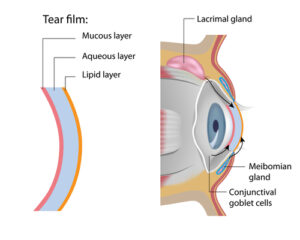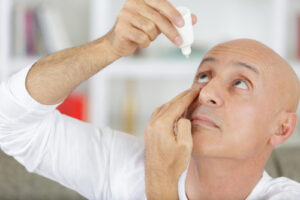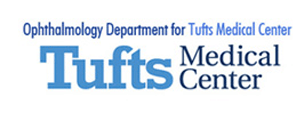Everyone’s eyes feel dry and itchy sometimes, but if you find your eyes are always dry and itchy, you may have a common, chronic condition. Dry eyes can be a side effect of several health conditions.
Having eyes that are frequently dry could even be dry eye syndrome, which is common in many older adults and especially women. There are many reasons your eyes can start to feel dried out.
If your eyes are feeling dry, there’s no reason to accept the discomfort. Call your eye doctor so you can get diagnosed and treated.
When left untreated, having dry eyes can have consequences for your health. Keep reading to find out why it’s time to treat your dry, itchy eyes once and for all!
Dry Eye Syndrome
Dry eye syndrome is a very common condition that can affect anyone. The people most likely to develop the condition are adults over the age of 40 and women, especially women going through hormonal changes.
These are often due to pregnancy or menopause. It’s important to realize that you can also develop dry eye even if you fall outside of this age range.
Dry eye may also be the side effect of a more serious condition or medication. Start by checking in with your primary care physician if you experience frequently dry eyes so they can rule out these possibilities.
Dry eyes are usually the result of your eyes creating inadequate tears. This is usually due to one of two reasons.
One, your eyes aren’t producing enough tears. Two, the tears you’re currently producing are lacking proper nutrients and don’t properly lubricate the eyes.

Your tears are composed of mucus, oil, and water, which are all found in the tear film. If your tears have too much mucus and oil and not enough water, they won’t be as effective at keeping your eyes moisturized.
Your tears also have a film around them that’s produced by the meibomian glands. One common cause of dry eye syndrome is meibomian gland dysfunction (MGD).
Without the film produced by these glands, your tears evaporate faster than they should on the surface of the eye. Whatever the cause of your dry eyes, you should know that left untreated, there can be serious health consequences.
Long-Term Risks
There are several risks associated with having dry eyes over an extended period of time. The moisture in your eyes is part of what keeps them healthy and flushes out bad bacteria.
Without enough moisture, it’s easier to get eye infections and ulcers on the surface of your cornea. These growths often leave scar tissue and lead to vision loss.
Luckily, there’s no need to let things get that bad. Treating your dry eyes can be easy! Most treatments and preventative measures are completely non-invasive.
Treatment and Prevention
Sometimes, dry eyes are simply something that occurs as a result of poor nutrition and hydration.
Drink more water and add more omega-3 fatty acids to your diet

Before your eye doctor prescribes more intensive treatment, they may start by recommending you drink more water. They may also suggest taking nutritional supplements. Omega-3 fatty acids are an important nutrient that helps your eyes produce tears.
You can get omega-3’s from supplements like fish oil or flax seed oil, but if you want the best results, incorporate these foods into your diet. Nutritional supplements are a good last resort if you know you’ll struggle to eat enough of a vitamin or nutrient.
Try to incorporate more fish in your diet, like salmon, tuna, or sardines. If you don’t like fish or don’t eat meat, you can also get plenty of your omega-3 fatty acids from flax seed, chia seeds, and walnuts. Dark leafy greens are also very good for your eye health.
Change your environment and take care with the AC
Changing your environment can also help reduce the severity of your dry eye symptoms. If you’re frequently out in the sun, you should wear sunglasses and make sure you’re staying hydrated.

If you spend a lot of time inside, take care to avoid having your AC blowing right on you. It may feel good, but you run the risk of drying out your eyes and making your dry eye symptoms worse.
Invest in a humidifier for the rooms you spend the most time in
You can also invest in a humidifier to make the air in your home or office less dry. Consider putting one in any of the rooms that you spend the most time in, like your bedroom or your living room.
Use artificial tears and eye drops if you have dry eye discomfort

If you’re experiencing discomfort due to dryness, artificial tears and eye drops can be quite helpful. These provide immediate relief.
Try lubricating eye drops to get the extra lubrication that your eyes may not be capable of providing. You can buy artificial tears and eye drops at most drugstores.
You can even use them in conjunction with other non-invasive treatment options. But if none of those things help, there are treatments you can get from an eye doctor.
Punctal Plugs
Sometimes, inserting plugs into the tear ducts can help tears stay on the surface of the eye longer. Known as punctal plugs, your ophthalmologist inserts them during a minimally invasive procedure.
For many patients with dry eye syndrome, they are an effective treatment method and help with reducing symptoms.
Light Therapy
Another less-invasive treatment option for dry eye syndrome is light therapy. With light therapy, the meibomian glands are specifically targeted.
The light used pulses around the eyes to unclog the meibomian glands, allowing them to produce the oils that make up the tear film. The procedure requires no surgery and takes about fifteen minutes.
Meibomian gland dysfunction (MGD) isn’t always the cause of having dry eyes, but it is often. If your dry eye isn’t due to your environment or another condition, it may be due to MGD.
If it is MGD, you may have success trying light therapy as a treatment option.
Sick and tired of having dry, itchy eyes that don’t seem to get any better? It’s time to get help by scheduling an appointment to discuss your dry eye treatment options at New England Eye Center in Boston, MA, now!




